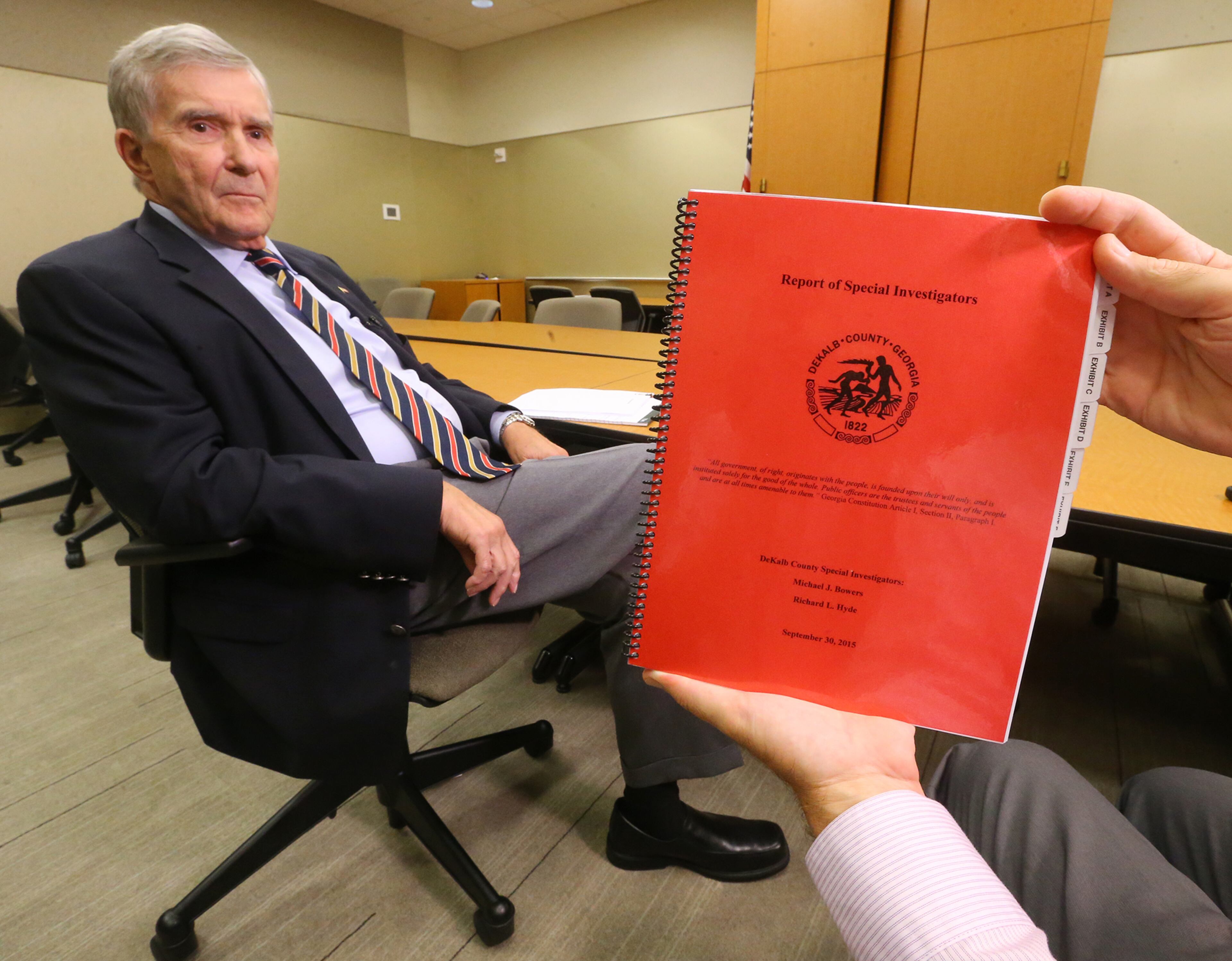DeKalb corruption investigator’s notes describe bribery scheme
DeKalb County's special corruption investigators discovered what may have been a scheme involving a garbage collector taking cash for extra pickups, documents obtained by The Atlanta Journal-Constitution show.

Though the scheme was labeled "bribery" in a brief mention in the final report by former Georgia Attorney General Mike Bowers and investigator Richard Hyde, their detailed backup notes also describe retaliation, with a business owner receiving no trash pickup at all when he stopped paying.
The notes, which the AJC obtained Thursday through an open records request, say the probe came to a halt in early August, when interim CEO Lee May suspended the investigators' work amid a public falling out with Bowers. "At this point," the notes say, "the evidence that (a county employee) has been accepting bribes from Sanitation customers is not conclusive."
The possible bribery scheme wound up comprising just four lines in the damning, 40-page report that Bowers and Hyde released last month. The report said only that “an allegation of bribery was made involving county employees,” and that the team would be turning their information over to the GBI.

But notes written by one of Hyde's hired investigators, Jim Lunsford, lay out preliminary findings in detail. The records quote the owner of a nightclub in Decatur saying that he paid a man $160 cash to empty his dumpster twice a week, instead of once a week. The sum covered two months.
Ordinarily, twice-a-week servicing of the dumpster would cost the business an extra $175 per month.
DeKalb County's chief operating officer, Zachary Williams, said he didn't know what department the alleged scheme involved until the AJC sent him the notes Thursday. He said he will turn the information over to DeKalb interim Police Chief James Conroy.
"I'll give it to our police department," Williams said, "and I guess they will coordinate with the GBI, because obviously you only need one agency investigating, so we don't compromise one another's investigation."
As for the trash route in question, Williams said he wasn't sure what to do yet. He said he will confer with Conroy and the acting Sanitation director.
"If there's bad stuff going on, we want to fix it, and it's as simple as that," Williams said. "We want to make it right, because our reputation's at stake."
It’s not clear in the nightclub owner's account if the man he paid actually worked for DeKalb County Sanitation. The owner said he bought the club in January, and a previous manager told him he made cash payments for extra trash pickup for $80 a month.
Soon after that, the new owner said, a man paid him a visit, identifying himself as “the trash guy.” The man drove his personal vehicle, and notes of the interview do not say what the man was wearing. The trash got picked up at 6 a.m., so the owner never saw who drove the garbage truck. The business owner "assumed the man was a county employee,” Lunsford's notes say.
The owner said when he cut the man off, saying he no longer needed extra pickups, he couldn’t get once-a-week service on a consistent basis anymore. Lunsford's notes say he confirmed that the owner complained about missed pickups in April.
The bar owner also described the man he paid as bald. A photo of the DeKalb County trash collector who works that route shows a man with long dreadlocks, according to the investigative notes. Other business owners in the area identified the employee as their trash man, but said he never solicited cash for extra pickups.
“It is possible (the Sanitation employee) could be bald now,” the notes say. “If this investigation were to continue, I would attempt to have (the nightclub owner) look at a photo line-up to see if he identified (the county employee) as the man he paid money to earlier this year.”
The AJC has reached out to the club owner, who did not immediately return a message to call. Neither he nor the Sanitation employee are being identified in this blog, since neither has been formally accused of wrongdoing.



